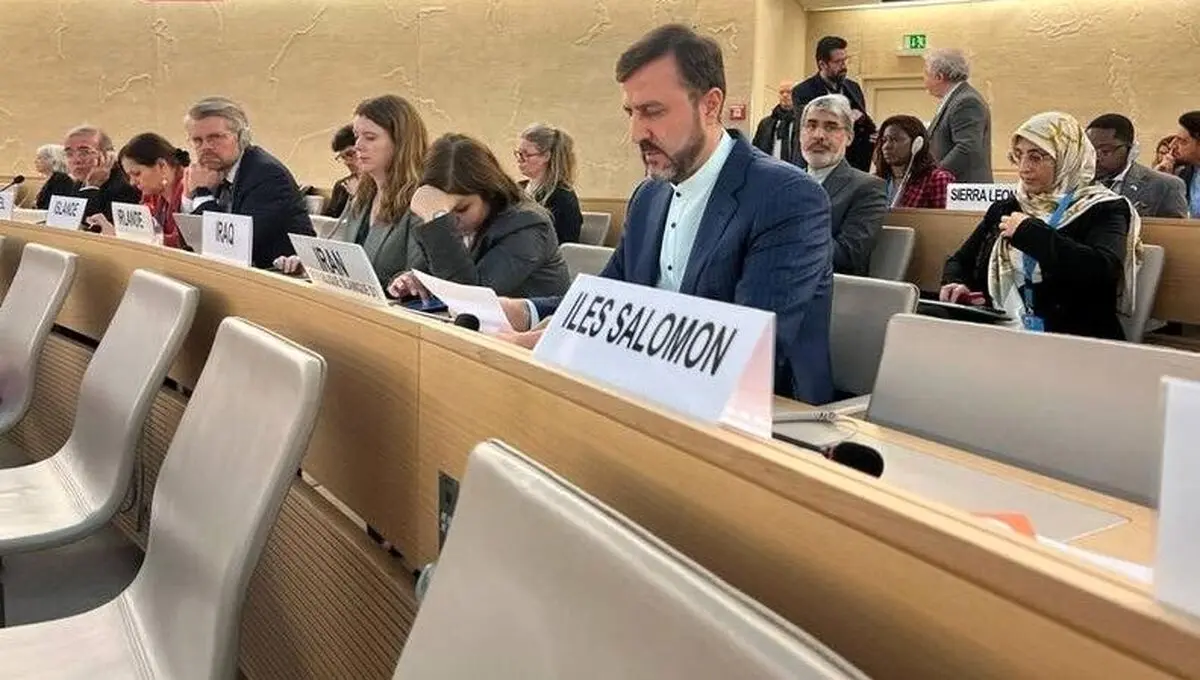Fact-finding mission's report drafted under West pressure: Iran

Secretary of Iran's High Council for Human Rights has rejected findings of a so-called UN fact-finding mission on Iran's conduct during the 2022 protests in the country, saying the report has been drafted under pressure from some Western governments.
"The report of this mission is, in fact, a repetition and legitimization of baseless claims that have been raised repeatedly in the anti-Iranian media and from the platforms of some Western governments, and it lacks any documented source," Kazem Gharibabadi said Monday at a meeting of the UN Human Rights Council in Geneva.
He reiterated that the so-called fact-finding mission was established as a result of lobbying by some Western countries, and its report was drafted under the pressure of these countries.
Established in November 2022, two months after violent protests erupted in Iran over the death of a young Iranian woman, Mahsa Amini, the UN fact-fining mission has released its report accusing the Islamic Republic of human rights violations in its handling of the foreign-backed rioting.
"The main role in this political campaign was played by the government of Germany, the same country that equipped Saddam's regime with chemical weapons of mass destruction, and as a result of the use of these weapons, more than 13,000 Iranian citizens were martyred and over 100 thousand were injured," he stated.
Gharibabadi was referring to the use of chemical weapons by the former Iraqi dictator Saddam Hussein during the 1980-1988 imposed war against Iran.
He said the self-proclaimed advocates of human rights -- including the US, Germany, Britain, France, and Canada-- exploited the death of an Iranian citizen to censure the state of human rights in Iran, while they have gravely violated the rights of millions of Iranians by imposing unilateral and oppressive sanctions against the country.
"On the other hand, these countries have supported terrorists who have taken the lives of more than 17,000 innocent people in Iran, including women and children, and have harbored them in their own lands," Gharibabadi said, referring to the Mujahedin-e Khalq Organization (MKO).
Representatives from a number of countries and organizations reacted to the report by Javaid Rehman, the so-called UN special rapporteur on human rights in Iran.
The Syrian representative in the meeting criticized the report, saying the world has witnessed such politically-motivated reports for years that have been devoid of their principles. He hailed Iran for its efforts to defend the rights of its people and said Damascus wants an end to such missions.
The Venezuelan representative touched on unilateralism, emphasizing that it is destroying multilateral processes that Iran is seeking for and is actively present in it. He said that Caracas fully defend Iran the way it protects the rights of its citizens.
The representative of Russia in Geneva highlighted anti-Iran sanctions their impacts on the people in the country.
In another part of the session, the representative of Brundi echoed the same sentiment, said political maneuvering and double standards only create tensions between countries.
Nicaragua's envoy to the session emphasized that UN rapporteurs must present their reports impartially and objectively.
Sudan's representative said that advancing human rights is the responsibility of all countries, saying: "We appreciate Iran's efforts to promote human rights."
Addressing the session, China's envoy to the session criticized unilateral sanctions imposed by the West against Iran as a violation of human rights.
The representative of Belarus also stated that the goal of the so-called fact-finding mission is political maneuvering rather than cooperation with Iran, asserting that the special rapporteur's report is based on fabricated information.
Meanwhile, Somayeh Karimdoost, Iran's representative at the Human Rights Council in response to Rehman's report said her country does not officially recognize the UN Special Rapporteur's mission.
Karimdoost called the report presented by Rehman predictable, distorted and the outcome of a completely political mission, which she said, was part of a coordinated campaign against Iran.
In the meeting, the Iranian representative emphasized that the report only pursues the political agenda of its backers.
“How are their claims and concern about human rights valid despite the genocide in Gaza?”, she questioned the content of the anti-Iran report on alleged human rights situation in Iran.
The Thalassemia Society and Chatra were the Iranian non-governmental organizations that highlighted the impact of sanctions on human rights at the meeting of the Human Rights Council.
A representative of Chatra, an Iranian charity, criticized Rahman's report for lacking independence and objectivity in addressing the issue of human rights in Iran.
The Defenders of Human Rights Center, a non-profit organization in Iran also told about the effects of sanctions on the Islamic Republic.
Two decades after the end of the war, many chemical victims are still suffering from injuries; many of them died in recent years due to lack of access to medicine, the organization told the meeting in Geneva.
A representative of the Association for Defending Victims of Terrorism emphasized that such reports have never truly reflected the human rights situation in Iran.
